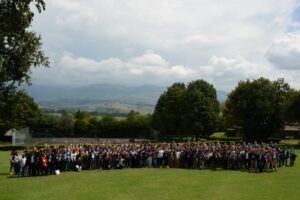Submit a Manuscript to the Journal
Transactions of the Royal Society of South Africa
For a Special Issue on
Southern African Mountains : Overcoming Boundaries and Barriers
Manuscript deadline

Special Issue Editor(s)
V. Ralph Clark,
Afromontane Research Unit, University of Free State, South Africa
clarkVR@ufs.ac.za
Stefan Schneiderbauer,
Global Mountain Safeguard Programme, United Nations University/Eurac Research, Germany/Italy
schneiderbauer@ehs.unu.edu
Cheryl Lombard,
The Peaks Foundation & SAMC2025 Secretariat, South Africa
secretariat@samc.africa
Alex Hickman ,
African Mountain Research Foundation, United Kingdom
alex@africanmountainresearch.com
Clara Hickman ,
African Mountain Research Foundation, United Kingdom
clara@africanmountainresearch.com
Southern African Mountains : Overcoming Boundaries and Barriers

This Special Issue is devoted to papers delivered at the 2nd Southern African Mountain Conference (SAMC2025) held at the Champagne Sports Resort from 17 to 20 March 2025., which showcased southern African mountain research, policy, and practice.
Media Statement by the SAMC2025 Primary Partners:
2nd Southern African Mountain Conference (SAMC2025): Overcoming boundaries and barriers
The Primary Partners of the 2nd Southern African Mountain Conference (SAMC2025) – themed Overcoming boundaries and barriers – are pleased to share that the event achieved all key outcomes.
SAMC2025 was a key activity in the Partners’ combined contribution to the United Nations’ Five Years of Action for the Development of Mountain Regions (2023–2027), successfully built on SAMC2022, and further enabled the vibrant, growing Community of Practice for (southern) African mountains. SAMC2025 was attended by 313 delegates from 22 countries including 10 African countries. Most SADC countries were represented, including policy representation.
SAMC2025 created an enabling environment for stronger transboundary mountain co-operation from local to Southern African Development Community (SADC) scale. SAMC2025 enabled conversations for bridging traditional and elected governance systems for mountains, bridging disciplines for sustainable mountain futures, and bridging science, policy and practitioner sectors. It also enriched the discussion on cross-border environmental problems, early warning systems, and disaster risk management with a competent mountain perspective that is otherwise largely missing.
Through high-level representation – at Ambassadorial, Vice-Chancellor, SADC Secretariat, UNESCO, Royal House, Alpine Convention, International Mountain Conference, and United Nations (Mountain Partnership) scale – SAMC2025 has also become an accelerator for stronger representation of African mountains at global scale.
Flagship events that will resonate for a long time include special sessions on Transboundary Water Governance, SADC Transfrontier Conservation Areas, Southern African Mountain Biodiversity, a proposed SADC Mountain Treaty/Convention, and the first-ever Royal Mountain Indaba.
Capacity building was a high priority for enabling the next generation of science, policy and practitioner sectors for southern African mountains – especially given that Africa’s population is the world’s youngest on average. This was achieved by post-graduate students and post-doctoral fellows presenting alongside seasoned scientists, a dedicated academic Early Career Summit, and a technical workshop on mountain instrumentation. The top three Master’s and Doctoral presenters were awarded SAMC2025 prizes, with the top three Doctoral presenters also awarded travel grants by the International Mountain Conference (#IMC) to attend the #IMC & Summer School in Austria (September 2025).
SAMC2025’s impact was achieved through 4 high profile keynotes, 249 presentations (21% being by post-graduate students) across disciplines – including a strong humanities & arts component – in 8 parallel sessions, 9 special sessions, 1 poster session, 3 book launches, a film premiere, and a vibrant gala dinner featuring the Drakensberg Boys Choir and internationally acclaimed climber and speaker Ms Saray Khumalo.
The SAMC2025 Partners express deep gratitude to UNESCO for Official Patronage, and to the generous sponsors and funders: Mountain Club of South Africa, University of the Free State, Centre for Development and Environment, Global Mountain Biodiversity Assessment, Campbell Scientific, GIZ, National Research Foundation, National Convention Bureau, and UNESCO Southern Africa. The Partners express sincere appreciation to The Peaks Foundation for implementing, and Champagne Sports Resort for the magnificent facilities.
Prepared by the:
Afromontane Research Unit, University of the Free State, South Africa
African Mountain research Foundation, United Kingdom
GLOMOS – Global Mountain Safeguard Research Programme, Eurac Research & United Nations University
Submission Instructions
We do not wish to prescribe too much, we do require a short covering letter that provides the names of up to 6 potential reviewers - this is to speed up the process of inviting reviewers.
